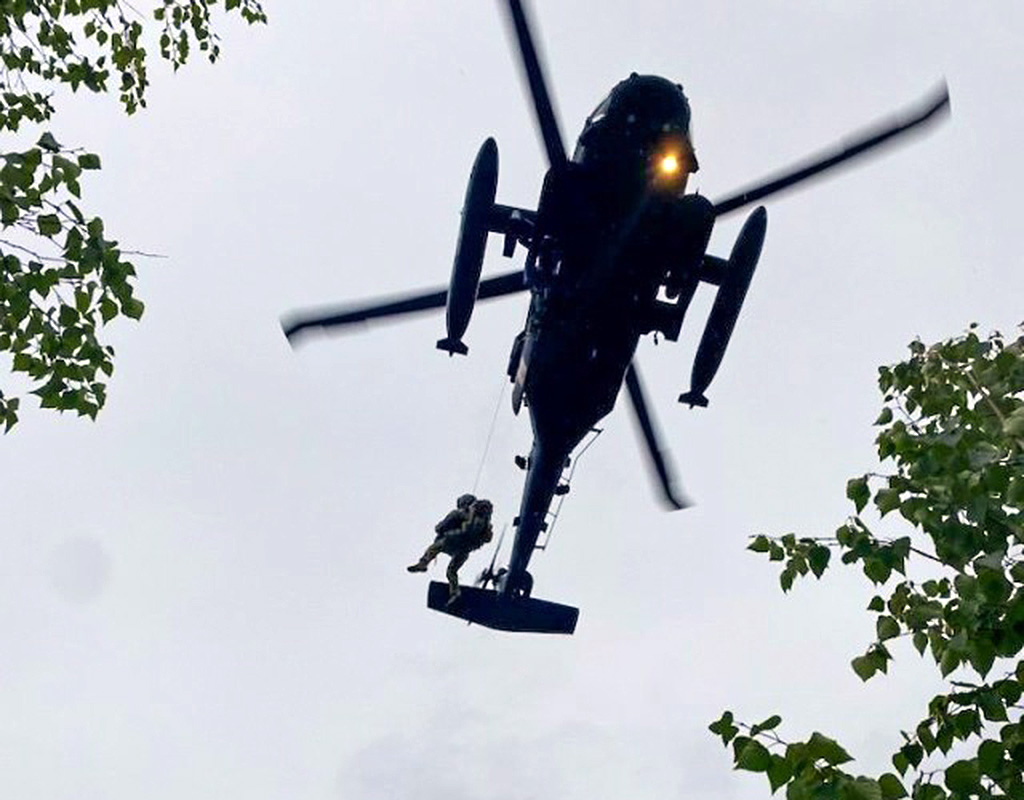
Soldiers assigned to Charlie Company, 1-52 General Support Aviation Battalion, 16th Combat Aviation Brigade, performed an aeromedical evacuation of a civilian near Angel Rocks, Alaska on Aug. 24, 2023.
The mission started when a woman fell approximately 30 feet, sustaining head and back injuries. Alaska State Park Rangers arrived on scene after receiving an SOS message from the woman’s iPhone.
The Rangers determined the best course of action for the patient would be aerial evacuation; federal support was requested through the Alaska Rescue Coordination Center for a high-powered helicopter with hoist capability to recover the patient.
At 6:28 p.m., a U.S. Army HH-60L Black Hawk helicopter departed Fort Wainwright for the patient’s reported location near Angel Rocks, Alaska.
“On the way out to the point of injury, approximately 50 miles northeast of Fairbanks, we flew through several areas with rain and low visibility, but it cleared up near the trail. Upon arrival at the scene, we completed a low pass and noted that there was nowhere to land, as the Angel Rocks trail is a steep mountain path about two people wide.
“We decided to orbit the area for approximately 20 minutes to burn off enough fuel to safely conduct hoist operations. After we were light enough, we hoisted our flight paramedic, Staff Sgt. Beau McIntosh, down,” said Chief Warrant Officer 3 Alex Wilson, the pilot in command of the mission.
The aircrew continued to orbit the area while the medic and park rangers prepared the woman for transport, eventually coming to a hover again to deliver an additional piece of equipment at the request of the medic.
“The park rangers had been on scene for approximately 20 minutes and had provided basic aid to the patient, kept her warm, and protected her from the elements. The patient stated that she and her boyfriend were exploring one of the lookouts when she slipped and fell about 15 to 20 feet down a rock face. We took [cervical spine] precautions and secured the patient in a [metal] basket to hoist her out of the confined area. Once in the aircraft we treated her injuries and provided pain management until we got her to the next level of care needed,” McIntosh said.
After the patient was secured in the aircraft, she was transported to Fairbanks Memorial Hospital, arriving at 8:16 p.m., and the aircrew returned to Fort Wainwright.
“We are honored to be able to support our community by providing Alaskan civilians with support on their worst days. We would like to extend our gratitude to Chief Ranger Sam Braband and Ranger Wyatt Derner for their assistance on the ground, and we look forward to continuing to hone our skills so that we are ready to conduct more of these missions in the future,” said Charlie Co. First Sergeant Kimberly Brown
Based out of Fort Wainwright in central Alaska, the unit operates 24 hours a day, seven days a week, to provide aeromedical evacuation support for thousands of service members training at Fort Wainwright each year.
Additionally, the unit works with the Alaska Rescue Coordination Center and local emergency services to provide rescue coverage in northern Alaska’s remote wilderness areas.
This life-saving mission is a collaborative effort: As the only active-duty Army aeromedical evacuation unit in Alaska, every member of the team is vital to the mission.
The 16th Combat Aviation Brigade operates two aeromedical evacuation units that provide defense support to civil authorities: U.S. Army Air Ambulance Detachment-Yakima in central Washington and Charlie Company, 1-52 General Support Aviation Battalion in central Alaska.

